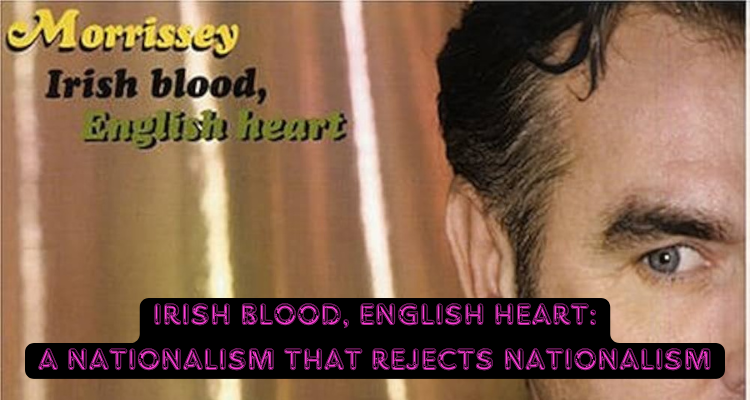Unlike some of Morrissey’s more ambiguous songs, Irish Blood, English Heart lays its themes out plainly, bluntly, and unapologetically. It’s a declaration of disillusionment with the political establishment, a rejection of the shame and contradictions of English identity, and a plea for a nationalism that isn’t rooted in exclusion, empire, or reactionary nostalgia.
It’s also one of Morrissey’s most misunderstood songs—not because its meaning is hard to grasp, but because people don’t want to acknowledge the contradictions at the heart of national identity.
I’ve been dreaming of a time when
To be English is not to be baneful
To be standing by the flag not feeling shameful
Racist or partial
These lines cut straight to the core of the problem:
- To be English is to carry the weight of colonialism, class oppression, and empire.
- To stand by the Union Jack is to inherit centuries of violence, conquest, and exploitation.
- The progressive response to this has often been to reject Englishness entirely—to see patriotism as inherently reactionary, racist, or imperialistic.
But Morrissey doesn’t want to reject Englishness. He wants to redefine it.
He dreams of a time when English identity isn’t synonymous with historical guilt, when people can reclaim their national identity without it being poisoned by its past. This is the same ideological move he flirts with in The National Front Disco—the idea that nationalism doesn’t have to belong to the right-wing.
The Absolute Rejection of the Political Establishment
I’ve been dreaming of a time when
The English are sick to death of Labour and Tories
This is where Morrissey’s anti-establishment stance fully crystallizes. By the time this song was released in 2004, Britain had already experienced:
- The failure of New Labour—Blair’s government, which had abandoned working-class politics for neoliberal centrism.
- The continuation of Tory elitism—the same class-driven politics that had dominated Britain for decades.
Morrissey isn’t calling for a new party or a different leader—he’s saying that the entire political system is rotten. This is why his later support for outsider movements (like For Britain) isn’t as surprising as people pretend it is. His frustration isn’t about left vs. right—it’s about the fact that traditional politics always leads to the same outcome.
Irish Blood, English Heart – The Duality of Identity
The song’s title itself is a contradiction:
- Irish Blood – A history of colonial oppression, British rule, and the struggle for independence.
- English Heart – A cultural identity that, despite everything, Morrissey still belongs to.
This is the paradox of English nationalism: it is a nation that both oppressed and was oppressed, a country that built an empire yet abandoned its own working class. Morrissey embodies this contradiction—an Englishman of Irish descent, someone who both hates what Britain has done and still dreams of something better.
This is why Irish Blood, English Heart feels both defiant and mournful. It isn’t a patriotic anthem, but it also isn’t a rejection of Englishness. It’s a search for a national identity that isn’t defined by either guilt or conquest.
Conclusion – A Nationalism of the Betrayed
Irish Blood, English Heart is a song about longing for an identity that doesn’t exist. Morrissey wants an England that isn’t defined by its past sins, a politics that isn’t controlled by the ruling class, and a nationalism that isn’t racist, reactionary, or exclusionary.
But that England never came. Which is why, like so many of Morrissey’s songs, Irish Blood, English Heart ends not with a resolution, but with a dream. Because that’s all that’s left.



